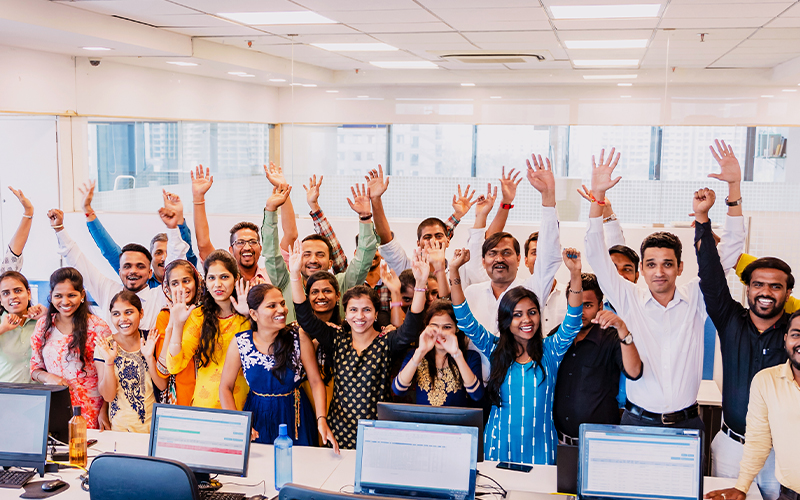Diversity equity and inclusion in the workplace is a burning topic of discussion in today’s business landscape. And, with good reason.
We are all different from each other and sometimes these differences can lead to discrimination. People from specific groups may be treated unfavourably in the workplace, or there may be instances of harassment, microaggression, etc., targeted at individuals or groups. This is precisely why companies are emphasising more and more on incorporating diversity, equity and inclusion (DE&I) in the workplace.
Numbers speak:
- A McKinsey report shows that ‘businesses in the top quartile for being culturally and ethnically diverse are 36% more profitable than those in the bottom quartile.’
- According to a Harvard Business Review, businesses with above-average diversity had 19% higher innovation revenues.
- Deloitte reports that 83% of millennials actively engage in work when they perceive their workplace as inclusive.
These figures are reason enough for you to accelerate your DE&I initiatives.
What is DE&I?
D stands for diversity: Diversity refers to recognising people from underrepresented groups like specific races, ethnicities, gender, physical ability and religion, etc.
E stands for equity: Equity promotes equal treatment for everyone by acknowledging and addressing structural inequalities.
I stands for inclusion: Building an inclusive workplace implies a workplace where equal opportunities are given to people from diverse backgrounds. In an inclusive workplace, all employees feel welcomed, valued and safe.
Value of diversity, equity and inclusion in the workplace
Diversity, equity and inclusion in the workplace have become important not only from the social perspective, but also from the business perspective.
- Attract and retain employees
- Fosters innovation
- A better understanding of customers
- Attract more customers
- A wider range of skills
- Enhances business outcomes
Potential employees, especially millennials and those from Gen Z, prefer a more inclusive workplace. Your brand will be able to attract top talent if it is perceived as one that prioritises D&I.
Also, a diverse and inclusive workplace is attractive to candidates from underrepresented groups and would interest them in working for your organisation.
An inclusive workplace makes employees feel safe and valued. Therefore, such organisations are more likely to retain employees.
If you do not implement DE&I practices in your organisation, you run the risk of missing out on a wide talent pool. This is because data reveals that millennials and Gen Z are the most diverse in history. For example, only 56% of 87 million millennials are white in the US.
When you have employees from diverse backgrounds, they bring a myriad of viewpoints to the table. Hence, creative and innovative ideas flourish. In an inclusive workplace, employees feel comfortable to share their ideas. Such an exchange of ideas proves beneficial for the business in the long run.
When your organisation has representation from different backgrounds you get a better understanding of buyers from diverse groups. You can assess their needs and pain points more accurately and tailor your products/services to meet the needs of a wider audience thereby extending the reach of your brand.
Also, better insights about customers of diverse backgrounds can help you create advertising products that resonate with everyone.
A brand that is perceived as one that fosters diversity, equity and inclusion in the workplace is attractive to buyers as well. This is because the buyers feel that the brand understands them and cares about their needs. Hence, they are more likely to make purchases from that brand.
By hiring people of diverse backgrounds, a business ushers in a wide range of skill sets because each individual brings in different skills, experiences and perspectives. An inclusive workplace provides organisations an opportunity for integrating wider perspectives when there are brainstorming sessions for developing new ideas.
When people of diverse backgrounds work in a cohesive environment, there is a larger exchange of ideas and experiences, etc. Team members can benefit from the experience and skill sets of other members of their team. Teamwork and collaboration boost productivity and provide the business with a competitive edge.
How can a manager drive diversity, equity, and inclusion in the workplace?
Managers have a vital role to play in ensuring that the organisation builds a diverse and inclusive work culture. The approach of the manager greatly influences the organisational culture.
- Managers need to establish DE&I goals that align with the business objectives of the organisation. They need to ensure that their recruitment strategy meets their DE&I goals.
- They must create an inclusive work culture where all employees are given equal opportunity. They must encourage open communication where employees from diverse groups feel comfortable expressing their opinions and know that they will be heard.
- Managers can organise training programs that help employees identify any unconscious biases they might harbour and take steps to mitigate them.
- Managers should be vigilant to identify any microaggressions, discriminatory behaviour, etc., among employees and address such behaviour early.
- It is the responsibility of managers to ensure fair compensation and performance evaluations in the organisation.
- By outsourcing the human resource functions to reliable partners, managers can build a diverse and inclusive workplace.
How can Infosys BPM help?
Infosys BPM offers Human Resource OutsourcingSolutions to help businesses meet their DE&I goals. We offer outsourcing solutions that can be easily customised according to your business needs. We leverage the best-in-class technology alongside expert consultancy services to help you build a diverse and inclusive workplace.







